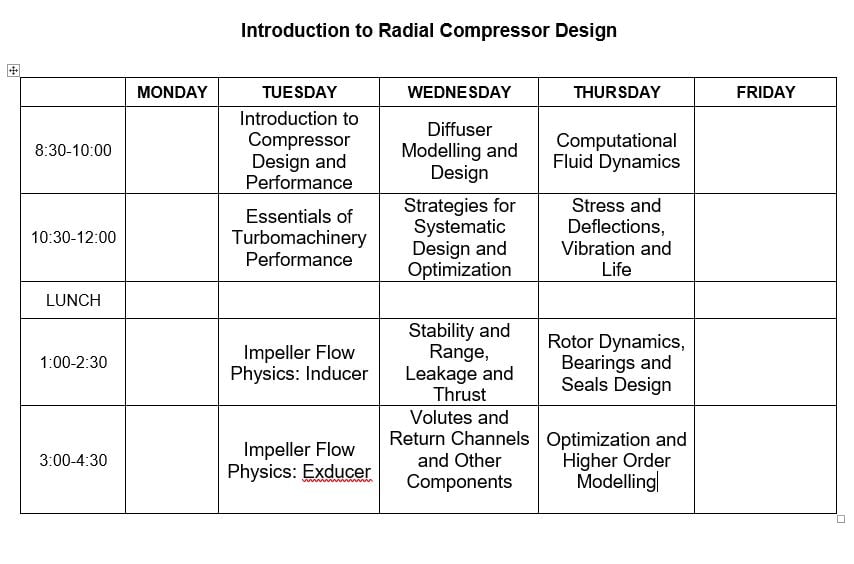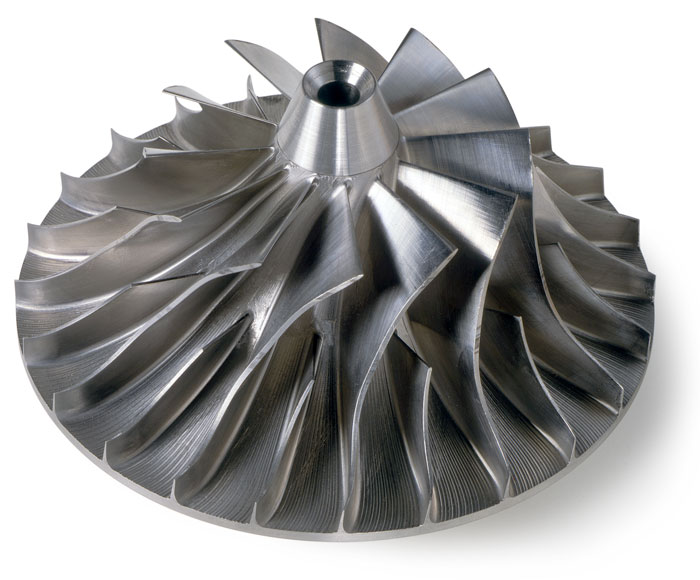Introduction to Radial Compressor Design
A detailed understanding of the aerodynamic behavior and structural integrity of centrifugal compressors is essential to meet competitive market needs. This course covers the fundamentals of radial compressor design along with the design process and analytical methods used to make state-of-the-art machines.
The entire development and design process from 1D to 3D viscous methods is taught, while stressing preliminary cycle work, velocity triangle optimization, blade loading considerations, viscous flow-field analysis, and structural analysis. Trade-offs between peak performance, range, life, and cost will be covered. Special emphasis is placed on surge, choke, design methodology, and model development. All lectures are given by internationally renowned authorities.
Program Outline
Turbomachinery Fundamentals
- Thermodynamic cycles
- Range and performance maps
- Velocity vectors
- Fluid properties and modeling
- Performance
- Momentum and energy exchange
- Turbomachinery parameters
- Inducer design
- Exducer design
- High-speed flow modeling
- The role of the diffuser in compressor performance
- Vaneless diffusers
- Cascade (airfoil) diffusers
- Channel (wedge) diffusers
- Design overview
- Design optimization strategies
- Design tools: meanline, blade generation, and CFD
- Review of steady stall
- Rotating stall in centrifugal compressors
- Surge
- Range extension and variable geometry
- The compressor inlet
- Volute
- Collector
- Return channel
- Causes of failure
- Blade and hub steady stresses
- Creep
- Fatigue failure
- Life estimation
- Rotor Dynamics
- Approaches to optimization
- Single Disciplinary Optimization
- Multidisciplinary Optimization
This course provides a survey of the design and analysis of centrifugal compressors. The objective of the course is to provide participants with:
- An overview and familiarization of the design and operation of the complete machine, and individual components of the machine
- A familiarization of the best design practices at all levels, from basic machine selection to the detailed aerodynamic and mechanical design of all components
- A guide to the different types of computer-based analysis tools available, and the applicability of each
- An understanding of how to achieve the best compromises between efficiency, range, cost, life, and durability.
Agenda
Optional Materials (Additional Charges Apply)
- Centrifugal Compressor Design and Performance, written by Dr. David Japikse
- Course Materials loaded on a USB drive for each student. Electronic Course materials files are included in the price of the course, charges only apply if you want them loaded on individual USB drives.
Instructors:
Mark Anderson
Mark Anderson is Chief Technology Officer at Concepts NREC. He has almost 30 years of experience in turbomachinery design and fluid modeling. He earned his B.S. in Mechanical Engineering from Northeastern University and a M.A. from the Massachusetts Institute of Technology. Mr. Anderson has conducted a wide range of research in the areas of hypersonic propulsion, turbomachinery modeling, and computational fluid dynamics. He spearheaded Concepts NREC’s meanline development, geometry parameterization, and quasi-3D and full 3D CFD, and was Vice President of Software Development for 10 years. He has authored or coauthored over 25 papers on turbomachinery, CFD, and environmental modeling.
Stephen Kohr
Stephen Kohr holds a B.S.M.E. and M.E.M.E. from The University of Hartford. He has a breadth of experience with structural and rotordynamic design optimization of radial and axial turbomachines. He specializes in structural design and analysis of static and rotating components to optimize life and minimize fatigue risk.









